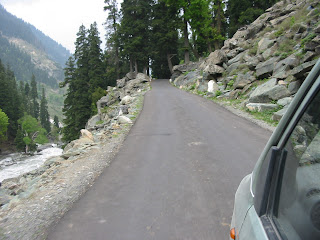We live once. Why do we leave so many tell-tale signs? - Part I: Space Junk
There are some things that boggle the mind if we think about them.
We humans reached space. Not only to discover the Universe's vastness but also to tap the cosmos for our own ends.
We ended up doing all these, and left not only Neil Armstrong's footprint on the Moon, but also tonnes of debris (jettisoned spacecraft parts, nuts and bolts, solar cells, abandoned satellites, paint chips, nuclear reactor cores, spent rocket stages, solid fuel fragments to name a few). Each of some 70,000 objects, ranging from tennis-ball-sized items to whole spent satellites and rockets, can cause immense harm to other spacecraft or on Earth, after reentry.
If you had wanted to find out the future trends in the space debris scenario, you will read typically obfuscating predictions. The verbose rhetoric sounds as though the space junk somehow happened to happen - try reading this passage quoted verbatim - "Because of the increased number of larger objects, lack of sufficient debris mitigation efforts such as collision avoidance could eventually result in collision-driven population growth. Various technical models for population growth have been developed by the international community. Most models agree that rapid population growth can occur in the absence of appropriate debris mitigation. They also agree that the population level required to trigger rapid growth in a given orbital region will be achieved before rapid growth is observed. Few models agree in predicting when such growth might become significant."
Aren't we responsible for the garbage we generate? It is disappointing that an organization created to study this issue - the Center for Orbital and Reentry Debris Studies - does not address and answer this question in its FAQ's.
It's time we started asking that question frequently. Whatever is manufactured, its ultimate logical, environment-friendly disposal ways and means will have to be specified. The alternative? Do not produce. That's the hard, harsh reality of it.
We humans reached space. Not only to discover the Universe's vastness but also to tap the cosmos for our own ends.
We ended up doing all these, and left not only Neil Armstrong's footprint on the Moon, but also tonnes of debris (jettisoned spacecraft parts, nuts and bolts, solar cells, abandoned satellites, paint chips, nuclear reactor cores, spent rocket stages, solid fuel fragments to name a few). Each of some 70,000 objects, ranging from tennis-ball-sized items to whole spent satellites and rockets, can cause immense harm to other spacecraft or on Earth, after reentry.
If you had wanted to find out the future trends in the space debris scenario, you will read typically obfuscating predictions. The verbose rhetoric sounds as though the space junk somehow happened to happen - try reading this passage quoted verbatim - "Because of the increased number of larger objects, lack of sufficient debris mitigation efforts such as collision avoidance could eventually result in collision-driven population growth. Various technical models for population growth have been developed by the international community. Most models agree that rapid population growth can occur in the absence of appropriate debris mitigation. They also agree that the population level required to trigger rapid growth in a given orbital region will be achieved before rapid growth is observed. Few models agree in predicting when such growth might become significant."
Aren't we responsible for the garbage we generate? It is disappointing that an organization created to study this issue - the Center for Orbital and Reentry Debris Studies - does not address and answer this question in its FAQ's.
It's time we started asking that question frequently. Whatever is manufactured, its ultimate logical, environment-friendly disposal ways and means will have to be specified. The alternative? Do not produce. That's the hard, harsh reality of it.


It's a fact that we create leave a lot of undesirable junk. Individually we can make an effort to limit them. But beyond that I don't know if it will be practical to cut them off altogether. Most of the things that we use, have some undesirable side effect. It is not practical to avoid them altogether. Minimize, may be yes.
ReplyDeleteMind boggling indeed Swarna.
ReplyDeleteBut presently my mind is boggled with the junk inside my house accumulated over the years.
Yes, Pradeep. I agree that producing stuff can't be avoided, every time the question needs to be answered conscientiously - "is it really needed, where will it go beyound its useful life?"
ReplyDeleteYou're right, Indrani. Each of us can assign ourselves big projects to sort, reuse and recycle available stuff!